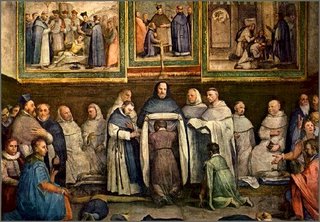Counsel and Piety
 "The Counsellor, the Holy Spirit, whom the Father will send in my name, he will teach you all things, and bring to your remembrance all that I have said to you" (Jn 14:26).
"The Counsellor, the Holy Spirit, whom the Father will send in my name, he will teach you all things, and bring to your remembrance all that I have said to you" (Jn 14:26).We have seen in past days how the Holy Spirit enlightens us to perceive rightly and He directs us to judge rightly. It is particularly noteworthy that so many of the Spirit's seven Gifts involve right judgment. In the Scriptures and in the 'Veni Creator Spiritus' hymn, the Holy Spirit is called the Paraclitus, the Counsellor, although it is sometimes translated as Helper or Comforter. Anyone who has been agonizing over an important decision may well understand what a comfort and a help a true Counsellor like the Holy Spirit is!
The Gift of Counsel is given us by the Spirit to "enable one to judge rightly in particular events what ought to be done in view of the supernatural ultimate end and personal sanctification." Unlike prudence, which is a very important virtue helping us to make moral judgments and which operates under the dictates of reason enlightened by faith, Counsel operates under the impulse of the Holy Spirit Himself and surpasses any judgment that human reason alone can arrive at. In fact, it often seems to run counter to human reasoning, as can be seen in the logic of the Beatitudes! In addition, fr Jordan Aumann OP gives the following examples:
"It is at times difficult to know how to equate suavity with firmness, how to reconcile the necessity of guarding a secret with the obligation to speak the truth, the interior life with the apostolate, an affectionate love with perfect chasity. It is even more difficult for persons charged with government and administration - in religion, in the family, in civil and economic life - to be able at every instance to do that which is prudent. In many instances, the prudent action will have to be the result of the operation of the gift of counsel."
The Dominican Rhineland mystic, fr John Tauler says: "The gift of counsel is sorely needed, in order that we may conduct ourselves in the way God wishes." Hence, this Gift is about our conduct, choosing rightly that we may do what is pleasing to God and consonant with our Christian faith. We are often faced with so many decisions in life; decisions that require prudence, but more than that, we need the Help, the Comfort and the good Counsel of the Holy Spirit.

Is it possible that in our contemporary Western societies, decisions to embrace the Cross and follow Jesus, decisions regarding a religious or priestly vocation may seemingly run counter to human reason? In common parlance, it seems "mad" to become a celibate priest or nun these days! Often people who are agonizing over a vocation are faced with many perfectly sensible objections from friends, family and themselves - they hesitate, vacillate and worry about the future. How can one commit oneself to God in a religious vocation? I would suggest that the Gift of Counsel comes to our aid to help us make the right decision, enlightening us with divine insight and judgment.
Fr Aumann maintains: "Thus it often commands actions for which human reason would never be able to give an explanation, nor would human reason alone, even with the light of faith, be able to come to such practical and particular judgments." Some might well call this a 'leap of faith', although it is more properly the exercise of the Gift of Counsel.
Another virtue often misunderstood and even mocked in some circles is Piety. The virtue of Piety is related to justice because it is a "supernatural habit that inclines us to render to our parents, our country and to all those connected with them the reverence and services due them." It is related to justice because it pertains to that which is due and thus within the natural order of things. Hence for Aquinas, religion is also related to justice as it is about giving due worship to God.
However the Gift of Piety (pietas) is "a supernatural habit infused with sanctifying grace, which arouses in the will, through the motion of the Holy Spirit a filial love for God as Father, and a sentiment of universal love for all men and women as our brothers and sisters and as children of the same heavenly Father." St Thomas Aquinas holds that just as the virtue of piety causes us to love and reverence our parents and our blood relatives, so too the Gift of Piety is not restricted to love and reverence for God our Father but all people, in so far as all are related to God.
Thus fr Richard Conrad OP explains that pietas can also be translated as Devotion and he teaches that this Gift of Piety or Devotion makes us able to hear the Counsel of the Holy Spirit. He writes:
"By the Gift of Devotion we can respect the people around us, we share God's real care for them, and help them the way they need, because we truly love them... Even if we are virtuous, we don't always know exactly what to do in the here and now... we need a 'feel' for the right way forward. In fact, we need the Holy Spirit's advice! And it is by the Gift of Devotion that we are able to hear that advice."
Hence Piety enables us to love our neighbour, to treat those around us, especially our parents, with the reverent love and respect which is their due. It enables us to look out for their needs, to minister God's love and care to them and to discern when and how to speak or act appropriately with regard to our neighbours' spiritual and personal well-being. Many of us know that one of the 'spiritual acts of mercy' is to rebuke the sinner, and yet we recongnize that not everyone does so in charity. Piety ensures that we are reverently disposed to our neighbour and do the right thing in the most Christian way possible!
As Hans Urs von Balthasar says: "Christ's love possesses the utmost tact. It knows how to combine the most intense demands with the most exquisite unobtrusiveness." It is this Christ-like tact that the Holy Spirit teaches us with His Gift of Piety.
Let us pray:
 Novena Prayer to the Holy Spirit
Novena Prayer to the Holy Spirit"O Holy Spirit, Lord and Giver of Life, You drew into unity a world whose speech and worship had been divided. Best of all teachers, You turned people from idols to the worship of the true God. In Your mercy hear our prayers, for without You no prayers are worthy of a hearing. Continue in our day the work you began at Pentecost; convince the world of that truth whose fruit is freedom."







0 Comments:
Post a Comment
<< Home